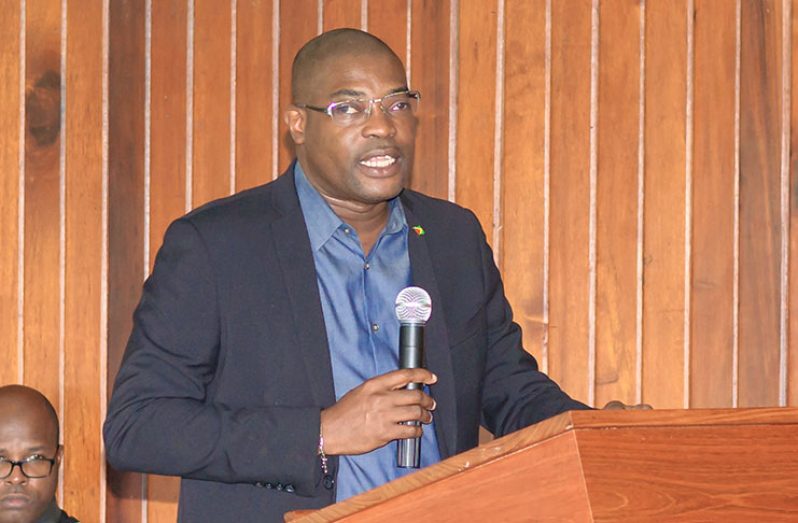— but Public Infrastructure Ministry still records successful year
THE public infrastructure ministry by December 31st is anticipated to have expended some 88 per cent of the $35.030B allocated for capital projects in 2017, as it records another year of success, but one not without its challenges.
According to public infrastructure minister, David Patterson, shortage of technical personnel and lack of capacity of contractors were among the challenges.
Minister Patterson, with support from public infrastructure ministry’s Permanent Secretary, Kenneth Jordan, and heads of key agencies in the areas of infrastructure, aviation, maritime and energy, detailed the successes and challenges faced by the sectors that fall under the mandate of the ministry at an end of year press conference at the Transport Sports Club, Thomas Lands, Georgetown.
It was during that press conference on Thursday that the permanent secretary disclosed that the public infrastructure ministry received a total of $42.326B for 2017, of which $7.296B was allocated for current expenditure, and $35.030B for capital expenditure having received three supplementary provisions.
Of the sum allocated for the current work programme, $6.997B or 96 per cent was expended and 68 per cent or $23.734B of the allocations for the capital work programme. However, Jordan assured the press that by Sunday, December 31, 2017, 88 per cent of the provisions made for capital projects would be expended, explaining that the Ministry is currently processing a total of $5.5B.
Minister Patterson said the success of the public infrastructure ministry was purely a team effort, as he saluted his staff at every level.
But while the ministry stands ready to redouble its efforts in 2018, he said the shortfall in technical staff at the ministry and the lack of capacity on the part of contractors cannot go unnoticed.

Alluding to the shortage of technical personnel, Minister Patterson said the situation is further compounded by competition from the private sector.
“We are competing with a very active and resurgent private sector. To that end, this year, even though we were able to recruit engineers for all of the 10 regions, we unfortunately loss some staff to the private sector,” the public infrastructure minister told reporters.
Admitting that such situations place additional “pressure” on the remaining staff, Minister Patterson assured that his ministry is actively addressing these issues in conjunction with the Ministry of the Presidency, Department of Public Service.
“It is not only a question of remuneration, but also the question of benefits, because we are competing with an active private sector,” he posited.
CAPACITY
Another major challenge faced by the public infrastructure ministry is that of capacity or the lack thereof, Minister Patterson noted.
“We are still faced with the fact that we have too few capable contractors in the system, and we urgently need to increase that capacity,” he explained.
Due to the lack of capacity on the part of many contractors, the large and medium-scale and even small-scale projects are often awarded to the larger companies.
“The large contractors, which number 20-25 large and medium-scale contractors, continue to receive the majority of the large, the medium-size and even the smaller contracts, purely because of the lack of capacity and this is something that we have to address,” Minister Patterson further explained.

Coordinator of the Works Services Group, Geoffrey Vaughn, echoed similar sentiments. Vaughn said while all of the 247 projects were contracted out for 2017, the shortage of experienced contractors remained a key problem.
“We have a lot of shortage of experienced contractors. The pool was large, yes, we do agree we had a large pool this year, because the pool was made up of over 500 plus contractors who were prequalified for works within the ministry. However, with that pool, what we have been seeing is that lots of the contractors who have been tendering, there is still a shortage with respect to experienced personnel, engineers,” Vaughn explained.
POOR PROJECT MANAGEMENT
It was further explained that contractors would identify an engineer on the tender document but after the contract is awarded, the named engineer is hard to be found. Poor project management is another issue of concern, he added.
“These projects are not managed effectively and efficiently by contractors. They are taking more than they can actually bite, so you find that they are ending up with quite a number of projects which we may not know of because other agencies may have already awarded contracts to them… so the capacity is not there,” Vaughn explained.
For this reason, the Works Services Group coordinator said a number of contracts had to be terminated due to issues such as limited capacity.
The public infrastructure ministry has assured that in 2018, the procurement system will be strengthened to ensure contractors are capable of effectively executing all projects awarded to them.
Additionally, they will be judged on previous projects, not just their technical capacity or price.
Additionally, the Government is moving ahead with plans to ensure that small and upcoming contractors are able to access at least 20 per cent of public contracts.
The policy papers for the procurement system and the 20 per cent for the smaller contractors are being crafted and are expected to be placed before Cabinet within the next two weeks for initial discussions.



.jpg)









